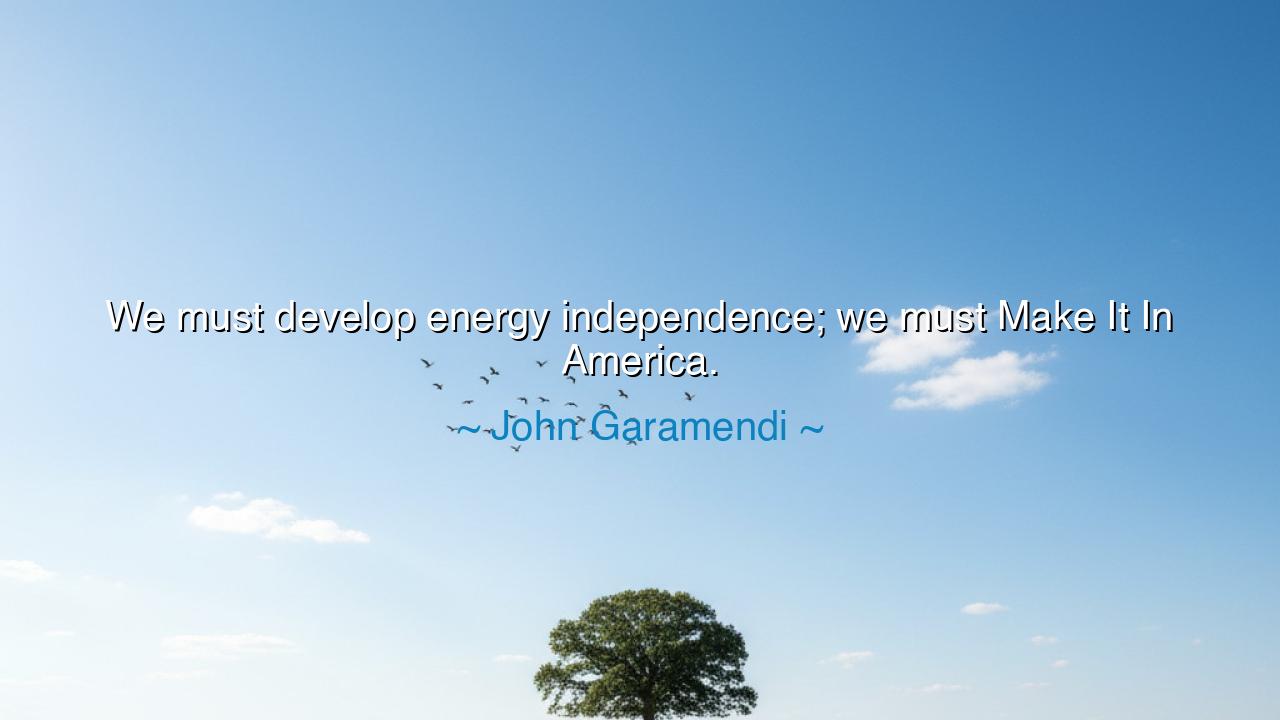
We must develop energy independence; we must Make It In America.






Listen closely, O children of the future, for the words of John Garamendi carry the weight of a truth that speaks directly to the heart of human independence and the relentless pursuit of self-sufficiency. He declares, "We must develop energy independence; we must Make It In America." In these words, Garamendi speaks not just of energy, but of a greater principle—the principle of standing strong on one's own, of building a foundation that is resilient, sustainable, and free from the control of external forces. Energy independence is not merely a matter of securing resources, but a matter of securing the future of a nation and the freedom of its people.
The ancient world offers many examples of nations and peoples who recognized the vital importance of self-reliance. The Romans, for instance, knew that the strength of their empire was built upon the ability to supply their armies and cities with the resources they needed. The Romans were not only master builders, but also master organizers of resources. They understood that to maintain their empire, they had to be able to produce and supply from within their borders, avoiding dependence on outside sources whenever possible. In their time, they built the Roman roads to secure the movement of goods and armies across their vast empire, ensuring that no matter the external pressures, they could sustain their independence through their own resources. Like the Romans, Garamendi's call for energy independence reflects the wisdom of past civilizations—only through self-sufficiency can a nation truly stand strong and weather the storms of the world.
The history of America itself is a story of self-reliance. From the earliest days of the Revolutionary War, the colonies fought for their independence not just from British rule, but from the economic constraints placed upon them. The colonists knew that in order to secure their freedom, they had to break free from the mercantile systems that kept them dependent on foreign goods and resources. Just as the Romans understood the importance of securing their own supplies, the American colonists understood that economic independence was inextricably tied to political freedom. The very birth of the United States was an assertion that a nation could stand on its own, without relying on the whims of other powers.
Garamendi's call to Make It In America is not merely a plea for economic growth, but for the restoration of a fundamental truth: that a nation's independence is built on its ability to create, produce, and innovate from within. In ancient China, during the reign of Emperor Qin Shi Huang, the Chinese understood that the key to maintaining a strong empire was the development of self-sufficiency. The emperor initiated grand projects like the Great Wall of China, not only to protect the empire but to secure its borders, resources, and sovereignty. The empire, like America, thrived by cultivating its own resources, its own labor, and its own technology. Garamendi’s words call for a modern equivalent—a return to the wisdom of nations that understood the value of cultivating their own strength and not depending on others for survival.
This idea of self-sufficiency and independence is not merely an economic matter but one that touches the very soul of what it means to be free. The Greeks, in their struggle against the Persians at the Battle of Marathon, fought not only for their land but for the right to live according to their own values, without interference from foreign powers. The Athenians knew that their ability to defend their freedom was tied to their ability to produce their own food, arm their own soldiers, and control their own destiny. Like the Greeks and Romans, Garamendi’s call for energy independence is a call for a deeper freedom—freedom not just from foreign domination, but from the chains of dependency that restrict a nation’s growth and potential.
So, O children, the lesson from Garamendi’s words is clear: true independence comes from the ability to stand on your own, to create, to produce, and to sustain yourself without relying on the whims of others. Energy independence is but one piece of the puzzle—a vital piece, to be sure—but the broader lesson is one of self-reliance in all areas of life. Just as the Romans, the Greeks, and the early Americans understood that their freedom depended on their ability to control their resources, so too must you understand that your freedom depends on your ability to shape your own destiny, to produce your own future, and to be self-sufficient in your endeavors.
Take this wisdom into your lives, O heirs of the future: do not wait for others to provide for you. Do not place your fate in the hands of those who seek to control your resources or your independence. Just as Garamendi calls on America to Make It In America, so too must you create your future with your own hands. Seek out ways to become self-reliant in your own life, whether in your education, your work, or your relationships. Stand firm in the belief that independence—true, lasting independence—is earned through hard work, innovation, and the courage to depend on yourself. May you, like the great nations of the past, find the strength to build a future that is yours to shape, and may that future be one of freedom, self-sufficiency, and endless possibility.






AAdministratorAdministrator
Welcome, honored guests. Please leave a comment, we will respond soon